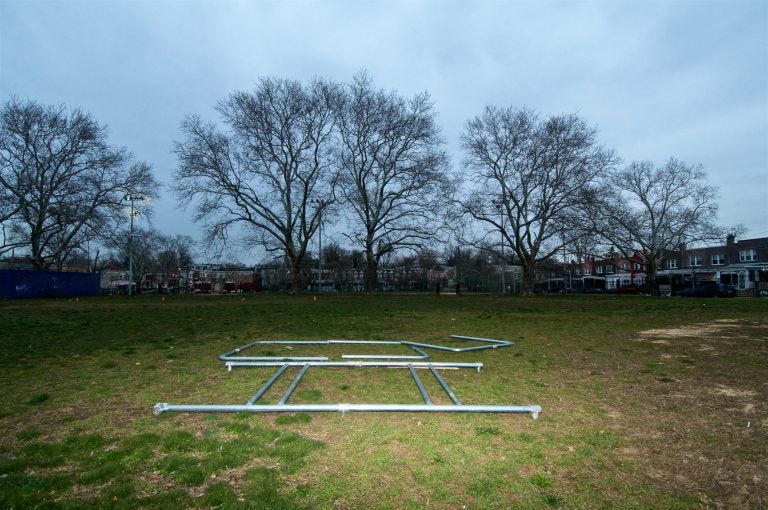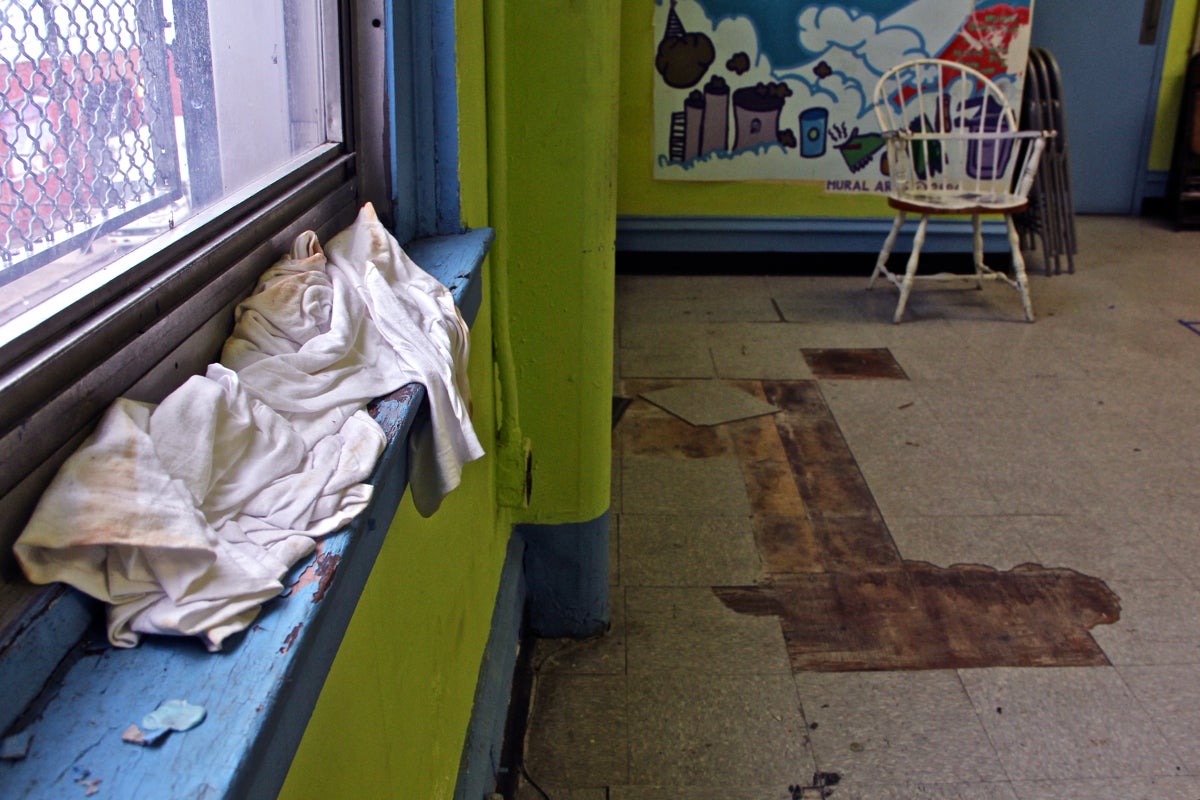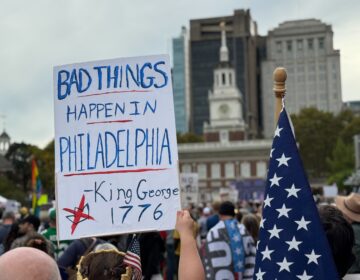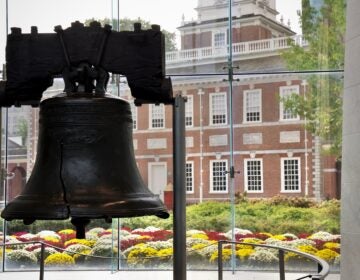Kenney walks back $500M Rebuild promise
The glowing “First 1,000 Days” report [pdf] released Oct. 1 by Mayor Jim Kenney contained 15 mentions of Rebuild, his most expensive and highest profile initiative.

There isn't lighting at the football field behind Lonnie Young Rec Center in East Germantown. (Bastiaan Slabbers for WHYY)
This story originally appeared on PlanPhilly.
—
The glowing “First 1,000 Days” report [pdf] released Oct. 1 by Mayor Jim Kenney contained 15 mentions of Rebuild, the most expensive and highest profile initiative of Kenney’s first term. But unlike past mentions of the heralded program, these didn’t include the $500 million price tag that the administration has used consistently since it introduced the program in 2016.
“Through the Administration’s signature infrastructure initiative Rebuild, we’re investing hundreds of millions of dollars in our neighborhoods by renovating our aging recreation centers, playgrounds, parks, and libraries,” the report reads.
The subtle adjustment to “hundreds of millions” may seem innocuous yet it portends an intentional shift that could result in fewer dollars reaching neighborhoods hungry for functional, decent places to play and learn.
After an arduous legislative process to pass Rebuild in 2017, City Council vested the administration with up to $300 million in borrowing power for the program. That $300 million, financed with revenue from Kenney’s tax on sugary beverages, leveraged grant dollars from William Penn Foundation and other foundations to reach the $500 million figure.
Now, for the first time since the Supreme Court upheld the soda tax, the administration is acknowledging the real possibility that it might not use its entire borrowing leash.
“Regardless of the specific amount that we end up with — which could still be $500 million — Rebuild will still be a historic investment in neighborhood parks, recreation centers, and libraries,” said Mike Dunn, a spokesman for Kenney. Designed to restore public assets in neighborhoods with high rates of poverty, Rebuild appeared in the chapter of 1,000-days report entitled “Progress on Reducing Poverty and Restoring Equity to Neighborhoods.

A bold vision meets uncertain economic headwinds
The admission that less money could be spent on the mayor’s pet public work initiative comes after months of speculation. In March, Rebuild executive director Nicole Westerman said it was “too early” to say whether downward projections for the revenue raised by the Philadelphia Beverage Tax City would impact the bottom line of Rebuild.
In August, outgoing managing director Mike DiBerardinis, who’s credited as the visionary of Rebuild, voiced renewed confidence the City would be borrowing $300 million, with the first third of the bonds being issued by early November, although stopped short of a guarantee.
Two months later, there’s still plenty of dollars-and-cents ambiguity. “The amount of the first borrowing, and the rate have not yet been determined,” Dunn said in an email. “[It] will depend on market conditions at the time of the borrowing … If interest rates go down, we can borrow more. If they go up, we’ll have to borrow less.”
Despite the warning signs, City Council members said administration officials had not made it clear that the project’s scope could be shrinking.
“Rebuild not being a $500 million project anymore would be news to me, if that is the case,” said City Councilwoman Cindy Bass, who chairs the Council Committee on Parks, Recreation, and Culture Affairs.
The ambiguity is in some ways a byproduct of Kenney’s decision to finance Rebuild with revenue from his controversial tax on sweet drinks. When the administration first announced Rebuild back in 2016, interest rates were at rock-bottom lows — ideal borrowing conditions. Two years later, interest rates are rising for the first time in a decade. The administration’s decision to delay the issuance of bonds until the courts resolved all the legal challenges thrown at the soda tax resulted in programmatic delays that could claim millions of dollars in potential Rebuild bonds.
But that doesn’t mean Kenney has given up on the $500 million goal, Dunn said. With the realities of lower-than-anticipated beverage tax revenues and upwardly bound interest rates sinking in, city officials are chasing new funding sources.
“Rebuild is also actively fundraising and is in conversations with a handful of prospective funders,” Dunn said. Dunn said prospective funders include corporate donors as well as foundations.

So far, Rebuild already has received more than $5 million in hand from grants contributed by the Patricia Kind Family Foundation, the Surdna Foundation, and the William Penn Foundation — the latter of which has pledged more than $100 million to Rebuild over the extent of the program, some of which is structured as a matching grant to attract additional funders.
Borrowing fewer than $300 million through bond sales could have spillover effects on the finances. Three-fourths of the William Penn commitment is a 1-to-4 match, meaning the foundation will provide $75 million if the borrowing is maximized. It would decrease proportionately depending on the final bond numbers.
Less than a month to go before a November deadline DiBerardinis established over the summer for issuing the first bonds, the Kenney administration maintains that the specifics on borrowing are still not set in stone. If the administration does end up with less than $300 million in borrowed money, the dip in capacity will be framed as a small sacrifice instead of having no Rebuild at all. “Without the [Philadadelphia Beverage Tax] revenue, the City wouldn’t have the ability to afford to borrow the money,” said Dunn.
Independent of bond market conditions, more cash flow should be available to Rebuild in the near future. The bulk of the William Penn pledge — what stands to be the largest investment in the foundation’s history — will be released once the first tranche of bonds is issued. And while critics question why there isn’t more money being spent sooner, Kenney and foundation officials agree that the city is acting responsibly in an uncertain economy.
“This unprecedented grant would have been unlikely without the Mayor’s bold leadership and his willingness to commit to raise such a large fund and to adopt a data-driven and more strategic approach to investing those funds,” said Rebecca Morley, director of communications for the William Penn Foundation. “The conditions our board placed on the grant are intended to help maintain the integrity of the program and promote fidelity to the original principles and purposes of the initiative, including promoting financial accountability and public transparency.” “We believe Rebuild could be an important model for re-investment in community infrastructure that other communities and cities can learn from,” Morley added.
—
Disclaimer: The William Penn Foundation also supports WHYY.
WHYY is your source for fact-based, in-depth journalism and information. As a nonprofit organization, we rely on financial support from readers like you. Please give today.







